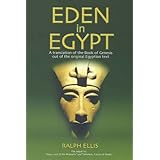
Average Reviews:

(More customer reviews)One overriding theme permeates Eden in Egypt, which is that Ralph Ellis is a consummate advocate of his own work. Throughout the book he constantly referred to his other writings. Even with his unabashed self-advertising, I gave this book a high rating for curiosity factor; in his many rants Ellis raises a plethora interesting questions with respect to Biblical translation, history and artifact interpretation.
The read itself is a different matter. Ellis jumps topics with great frequency, makes incredible leaps and, as noted above, he relies heavily on his previous works (whereas the reader is expected to be fully familiar with the concepts forwarded). Make no mistake; Ellis clearly knows the history of Egyptian kings, Greek mythology, Mediterranean geography, and ancient Egyptian and Hebrew philology. He rounds out his skill set with a sound knowledge of the Koran and Biblical tradition.
Eden in Egypt offers much to consider and poses provoking questions related to the Book of Genesis and the revolutionary Egyptian King, Akhenaten. To be sure, this book could take a hum-drum Bible Study or adult Sunday School class and really give participants something to talk about.
Click Here to see more reviews about: Eden in Egypt: Adam and Eve Were Pharaoh Akhenaton and Nefertiti (Egyptian Testament)
The Bible says that a river flowed through the Garden of Eden and then split into four branches. There is only one river in the Near East that does exactly this, and that is the long oasis-garden of the Nile valley and its division into the (originally) four branches of the Nile Delta. This observation takes Ralph into the depths of the Genesis account, and it would seem that Adam and Eve were actually Akhenaton and Nefertiti; and so the Genesis story is actually a distillation of Akhenaton's Hymn to the Aten. Thus the Garden of Eden was originally the Garden of Aten (Akhenaton's god), and it resided at Amarna in Middle Egypt. The book also demonstrates that Hebrew is a direct descendant of the ancient Egyptian language, and that the Bible was written in Egyptian. This allows us to see that much of the Old Testament was based upon very ancient Egyptian law, stories and morality-tales.

0 comments:
Post a Comment